|
|
|
Sort Order |
|
|
|
Items / Page
|
|
|
|
|
|
|
| Srl | Item |
| 1 |
ID:
088363


|
|
|
|
|
| Publication |
2009.
|
| Summary/Abstract |
This article discusses the appropriateness of western bioethics in the African setting. It focuses on the decision-making process regarding participation in health research as a contested boundary in international bioethics discourse. An ethnomethodological approach is used to explain African ethics, and African ethic is applied to the decision-making process in the African community. An HIV/AIDS surveillance project is used as a case study to explore the concept of communitarianism. The article argues that what exists in Africa is communal or social autonomy as opposed to individual autonomy in the West. As a result, applying the western concept of autonomy to research involving human subjects in the African context without adequate consideration for the important role of the community is inappropriate. It concludes that lack of adequate consideration for community participation in health research involving human subjects in Africa will prevent proper management and lack truly informed consent.
|
|
|
|
|
|
|
|
|
|
|
|
|
|
|
|
| 2 |
ID:
173789


|
|
|
|
|
| Summary/Abstract |
In South Africa, community members have the constitutional right to partake in local governance and the local municipal council has the constitutional mandate to facilitate community participation. Qualitative research was used to assess the impact of power relations on community participation in the Mahikeng Local Municipality. The study findings indicate that power differentials contributed to the abandonment of the legislative provisions in the Mahikeng Local Municipality in the North-West Province of South Africa. Among other things, this paper recommends finalisation of the draft public participation framework. The framework should clearly identify and define the roles of the community, elected councillors and traditional authorities. The paper recommends the development of a strategy that includes clear and comprehensive public participation guidelines, protocols and processes to facilitate implementation of the framework. In consultation with the community, a detailed community participation schedule must be developed, implemented and continuously monitored and evaluated.
|
|
|
|
|
|
|
|
|
|
|
|
|
|
|
|
| 3 |
ID:
080700
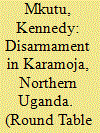

|
|
|
|
|
| Publication |
2008.
|
| Summary/Abstract |
Disarmament is a major feature of international, regional and national small arms and light weapons control policy and legislation worldwide. The proliferation of arms is now a significant problem amongst pastoralists in the Horn of Africa. In Karamoja, northern Uganda, where armed inter-communal and intra-communal conflict is disrupting lives and livelihoods, several attempts at mitigation have been tried. This article considers whether disarmament attempts have provided any solution to the conflicts. Empirical data collected between 2000 and 2006, consisting of interviews with combatants, local leaders and community members, government reports and media articles have been used to recount these endeavours and their consequences in the communities. The work first gives the regional and cross-border arms dynamics. It then considers the history of conflict and disarmament in Karamoja and examines in detail the recent disarmament since 2001. The successes or failures are considered in terms of weapons collected, mitigation of conflict and establishment of valuable processes such as community participation or inter-agency cooperation
|
|
|
|
|
|
|
|
|
|
|
|
|
|
|
|
| 4 |
ID:
089975
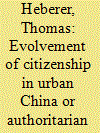

|
|
|
|
|
| Publication |
2009.
|
| Summary/Abstract |
Frequently, civil society is identified with an increase of associational life. Yet, in this article it is argued that the emerging of citizens and citizenship is a vital precondition for developing a civil society. Here I will focus on a concept of citizenship grounded in a local context. Accordingly, it focuses on both the public discourse on citizenship and the institutional effects with regard to citizenship generated by the establishment of urban neighborhood communities and the enhancement of participation. The author's hypothesis is that by virtue of newly established neighborhood communities in urban areas, a gradual transition from 'masses' to citizens seems to manifest itself. This transition process will be examined in four central fields: (a) community participation and grassroots elections; (b) self-administration (autonomy) and the attitudes of residents thereto; (c) the growth of individual autonomy; and (d) value engineering by the party state. As the institutional preconditions for a civil society in China are widely lacking, the party-state conceives its role in initiating them. It is precisely the combination of the top-down establishing of neighborhood communities and grassroots elections, mobilized participation and volunteers, which gives evidence of the party-state's intention to generate structures of an (illiberal and controlled) civil society. Citizen status has not yet been fully achieved in China; yet the state-led activation in urban neighborhood communities shows that the political leadership has decided to chart this course. Finally the article classifies the concept of neighborhood communities as a model of 'authoritarian communitarianism'.
|
|
|
|
|
|
|
|
|
|
|
|
|
|
|
|
| 5 |
ID:
080309
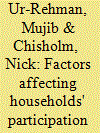

|
|
|
|
|
| Publication |
2007.
|
| Summary/Abstract |
In this article the factors affecting the attitudes and preferences of households regarding natural resource management in the Abbottabad district of Pakistan are analysed. The findings suggest that non-government organizations were doing better than government agencies in motivating the user groups towards sustainable use and management of natural resources through local organizations. However, it depends on the households' socio-economic status and its linkage with their livelihoods to participate in natural resource management activities. The study can assist policymakers by identifying the key areas for the implementation of their programmes related with natural resource management activities through community participation
|
|
|
|
|
|
|
|
|
|
|
|
|
|
|
|
| 6 |
ID:
176762


|
|
|
|
|
| Summary/Abstract |
Government support for the ongoing use of fossil fuels has polarised public opinion in Australia regarding the country's transition to low carbon energy generation. Despite this, polls indicate a desire for more meaningful engagement in the global energy transition amongst the Australian populace, which has stimulated a growing interest in Community Owned Renewable Energy (CORE). This study used a questionnaire based on the Theory of Planned Behaviour (TPB) to evaluate intention to invest in a CORE project that would be sited in Queensland, Australia. The analysis also sought to identify the considerations that would have the greatest association with this intention. 67% of respondents indicated an inclination to invest in the project and the mean intention score was 5.0 out of a possible maximum of 7 in favour of investing. This mean was relatively stable across almost all demographic sub-categories for gender, age, employment and income. Beliefs related to the community benefits that the initiative would provide were the most reliable attitudinal predictor of intention to invest. The findings concur with other studies that indicate widespread support for renewables amongst Australians and which suggest that “not in my back yard” (NIMBY) concerns are not a significant influence on negative attitudes towards renewable energy in Australia.
|
|
|
|
|
|
|
|
|
|
|
|
|
|
|
|
| 7 |
ID:
133100


|
|
|
|
|
| Publication |
2014.
|
| Summary/Abstract |
This paper examines the unintended prospect of international aid-driven maladaptation in Bangladesh. While attempts by aid agencies to channel scarce resources to finance structural adaptation measures are commendable, complementary non-structural measures remain under the radar. Using an exploratory research approach this paper investigates the state of cyclone shelters in two coastal districts: Chittagong and Cox's Bazar. The findings indicate that the lack of adequate shelter capacity, maintenance funding, and community participation has exacerbated the vulnerability of Chittagong's marginalised urban population. The paper contends that international aid can avoid being maladaptive by accentuating community-based governance and facilitating community capacity to fund the maintenance of cyclone shelters in new ways
|
|
|
|
|
|
|
|
|
|
|
|
|
|
|
|
| 8 |
ID:
185327


|
|
|
|
|
| Summary/Abstract |
This article is based on analysis of narrative interviews with individuals active in local community work in the aftermath of the Grenfell Tower fire. It explores how the public spaces and buildings around the tower were claimed and shared by the community, first for emergency support and then for collective mourning, remembrance, worship, and activism. Applying the social psychology of community participation, the article elaborates place identity as a form of social identity and shows how participation functions to organise shared representations of local conditions and facilitate empowerment for social change. Further, the article posits that, in contexts of urban super-diversity, the shared use of local spaces, including faith spaces, generates new forms of belonging-in-multiculture that can become the basis for community development and collective struggle against racialised marginalisation.
|
|
|
|
|
|
|
|
|
|
|
|
|
|
|
|
| 9 |
ID:
142623
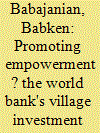

|
|
|
|
|
| Summary/Abstract |
This article examines the extent to which the World Bank's community-driven Village Investment Project empowered people to influence the choice of local investments (micro-projects) and to exact accountability from their leaders. It is based on qualitative interviews and group discussions in 16 rural communities. The research demonstrates that the project provided an effective mechanism for responsive infrastructure delivery to address local priority needs. However, it did not improve accountability either within or outside the micro-project boundaries. The project's bottom-up development model was not by itself sufficient to enable people to exercise power over local government officials and informal leaders in the absence of effective horizontal accountability institutions within the state.
|
|
|
|
|
|
|
|
|
|
|
|
|
|
|
|
| 10 |
ID:
175097
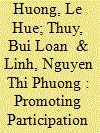

|
|
|
|
|
| Summary/Abstract |
This paper focuses on local people’s participation in the development of ecological cultural tourism in the Vam Nao reservoir area of An Giang Province, located approximately 180 kilomteres southeast of Ho Chi Minh City, Vietnam. Building on experiences of several countries on how to involve local people in natural resource management and ecotourism development, we interviewed 95 in-depth stakeholders related to natural resource management, tourism, environment, and people’s participation; distributed questionnaires to 340 tourists; and synthesised field survey data from 500 online visitor surveys. On the basis of analysis and evaluation of these materials, this paper suggests a new policy on tourism for An Giang provincial leaders involving preservation of local cultural values as support for ecological and cultural tourism in the studied area. In the last section, the paper makes recommendations for increasing community participation in areas similar to the one studied herein.
|
|
|
|
|
|
|
|
|
|
|
|
|
|
|
|
| 11 |
ID:
140390
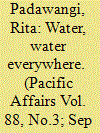

|
|
|
|
|
| Summary/Abstract |
Jakarta has entered an era of chronic flooding that is annually affecting tens of thousands of people, most of whom are crowded into low-income neighbourhoods in flood-prone areas of the city. As the greater Jakarta mega-urban region—Jabodetabek—approaches the 30 million population mark and the sources of flooding become ever more complex through combinations of global climate change and human transformations of the urban landscape, government responses to flooding pursued primarily through canal improvements fall further behind rising flood risks. Years of field observation, archival and ethnographic research are brought together in a political ecology framework to answer key questions concerning how government responses to flooding continue without significant participation of affected residents who are being compelled to relocate when floods occur. issue_image_88_3_PadawangiHow do urban development processes in Jakarta contribute to chronic flooding? How does flooding arise from and further generate compound disasters that cascade through Jakarta’s expanding mega-urban region? What is the potential for neighbourhoods and communities to collaboratively respond through socially and environmentally meaningful initiatives and activities to address chronic flooding? Floods, urban land use changes, spatial marginalization and community mobilization open new political dynamics and possibilities for addressing floods in ways that also assist neighbourhoods to gain resilience. The urgency of floods as problems to be solved is often interpreted as a need for immediate solutions, but flood-resilient communities are rooted in gains in resilience in non-emergency times by expanding rights to live in the city, to build houses and create vernacular communities by and for people
|
|
|
|
|
|
|
|
|
|
|
|
|
|
|
|
|
|
|
|
|